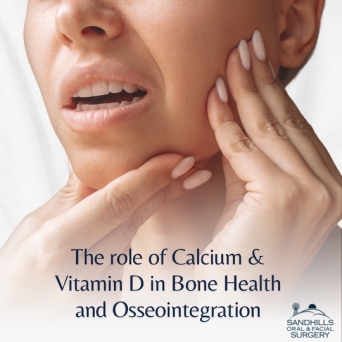Dental implants are an effective and long-lasting solution for replacing missing teeth, but their success heavily depends on the process of osseointegration- when the implant fuses with the jawbone. Proper nutrition, particularly adequate intake of vitamin D and calcium, plays a crucial role in promoting bone health and enhancing the success of dental implants.
Below is an overview of the importance of vitamin D and calcium in supporting the osseointegration process and helping ensure the best possible outcome for your dental implants.
Vitamin D plays a vital role in the body's ability to absorb calcium and promote bone health. It helps in the following ways:
- Enhances calcium absorption: Vitamin D increases the efficiency of calcium absorption in the intestines, which is essential for bone mineralization.
- Stimulates bone remodeling: It aids in the remodeling of bone tissue, which is particularly important during the healing and osseointegration process.
- Promotes bone cell function: Vitamin D, encourages the activity of osteoblasts (bone-forming cells) and osteoclasts (cells that resorb bone), which helps maintain healthy bone turnover and repair.
Recommended Vitamin D Intake:
- Adults (under 70 years): 600-800 IU per day
- Adults (over 70 years): 800-1,000 U per day
- Sources: Fatty fish (salmon, mackerel), fortified foods (milk, cereal, orange juice), eggs, and exposure to sunlight.
- Vitamin D supplementation: Cholecalciferol (vitamin D3)
For those undergoing dental implant surgery or aiming to support bone health through osseointegration, a higher dose may be recommended, especially if there is a deficiency. This is typically 1,000-2,000 IU per day - The tolerable upper intake level for vitamin D set by the National Institutes of Health
(NIH) is 4,000 IU per day for adults.
Calcium is the primary mineral found in bones and teeth, providing structure and strength.
Adequate calcium intake supports:
- Bone density: Calcium contributes to maintaining or increasing bone density, which is essential for osseointegration and overall bone health.
- Bone healing: After implant placement, calcium helps support the repair of bone tissue around the implant site, ensuring the implant bonds securely to the bone.
Recommended Calcium Intake:
- Adults (19-50 years): 1,000 mg per day
- Women (51+ years) and Men (70 years): 1,200 mg per day
- Sources: Dairy products (milk, cheese, yogurt), leafy greens (kale, spinach), fortified plant-based milks, almonds, and calcium-fortified tofu.
By Kerrigan Shelton, PA-S

